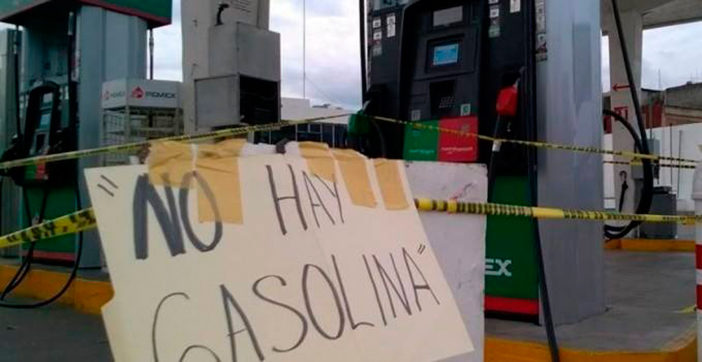(By Reuters: David Alire Garcia, Marianna Parraga)//
MEXICO CITY — President Andres Manuel Lopez Obrador has launched the most sweeping attack against rampant corruption and organized crime of his young administration: aiming to stop a growing fuel-theft racket that has grown dramatically in recent years.
The new leader is seeking to stem the theft from key pipelines that transport fuel, but the effort to re-route distribution via trucks has provoked long lines at gas stations while threatening to crimp the economy and damage his popularity if shortages persist.
Since last month, veteran leftist Lopez Obrador has ordered the closure of six major pipelines especially vulnerable to illegal taps where criminal gangs and other thieves have siphoned off stolen fuel worth billions of dollars.
The new president, who took office in December, won a landslide election victory on promises to root out endemic corruption, strengthen ailing national oil company Pemex and ensure stable fuel prices.
WHY IS THERE SO MUCH FUEL THEFT IN MEXICO?
Mexico’s fast-growing motor fuel market is a juicy target for thieves. It is the world’s sixth biggest, according to energy ministry data, featuring a total daily demand of nearly 1.18 million barrels of gasoline and diesel.
The Mexican government’s lack of attention has allowed organized groups to open clandestine taps along Pemex’s main pipelines. Internal complicity at Pemex refineries and terminals have also opened the door for theft of entire trucks loaded with fuel.
Fuel stolen from Pemex’s infrastructure mostly ends in the hands of the same retailers that legally sell Pemex gasoline and diesel.
HOW DID FUEL THEFT START AND WHO IS RESPONSIBLE?
Fuel theft has been a problem in Mexico for decades but it has been growing in recent years. The crackdown on the drug war has caused gangs to turn to other forms of theft, and the nation’s network of pipelines proved to be ripe targets.
Theft escalated in recent years following reforms to the country’s oil sector by previous president Enrique Pena Nieto, who liberalized the industry for foreign investment. In turn, retail prices rose, giving cartels an opportunity to undercut those prices through black-market sales of gasoline.
Thieves tap into pipelines and are currently siphoning off the equivalent of around one-fifth of total national gasoline consumption, about 150,000 barrels per day (bpd) according to Reuters calculations based on official data. They then re-sell mostly to complicit gas stations.
Pemex documented more than 12,500 illegal taps to its fuel pipeline network during the first 10 months of 2018, more than in the previous year. The widespread theft costs Pemex more than $3 billion annually, according to official numbers.
Lopez Obrador has said upwards of 80 percent of the theft is organized by Pemex employees, though he has not provided evidence. He has also pointed to reports that the union has been restricting access to parts of the company’s operations.
Central and western states including Queretaro, Guanajuato, Hidalgo, Michoacan and Jalisco are most afflicted by the pipeline theft, as well as Pemex’s Salamanca refinery, which has been especially plagued by organized crime and violent disruptions.
WHY ISN’T MEXICO PRODUCING ENOUGH GASOLINE?
For years, Pemex’s six domestic oil refineries have operated well bellow their capacity, due to a mix of underinvestment, deferred maintenance and frequent accidents, including deadly explosions that have provoked costly stoppages.
Las year, the refineries operated at about a third of their 1.63-million-barrel-per day crude processing capacity, compared with 2013, when they processed nearly 1.4 million barrels of crude a day.
WHAT IS THE GOVERNMENT DOING?
The new government began the closure of major fuel pipelines on December 27. Production at Pemex’s Gulf coast Madero and Minatitlan refineries has also been partially or completely halted, which contributes to the need for imported fuels as a replacement.
Lopez Obrador hopes some 5,000 tanker trucks can distribute supplies to over 11,000 gas stations scattered across the country. While the vast majority of the stations are Pemex franchises, a growing number belong to new private entrants, including giant ExxonMobil (XOM.N) and trading firm Glencore (GLEN.L), which in some cases import their own fuel.
The cost of transporting gasoline and diesel by tanker trucks is nearly 14 times more expensive than via pipelines, according to a study by Mexico’s Federal Commission for Economic Competition, or Cofece.
Both Pemex and Lopez Obrador have sought to assure an increasingly restless public that there is plenty of gasoline and that refineries and other key installations are being supervised by 4,000 soldiers. He has also pleaded with citizens to be patient while the new distribution system is normalized.
Lopez Obrador’s team has yet to explain how it will finance the much more expensive distribution costs it is now incurring.
(Additional reporting by Adriana Barrera in Mexico City and Jarrett Renshaw and Stephanie Kelly in New York; Editing by Chizu Nomiyama)
TEXT: REUTERS NEWS AGENCY










